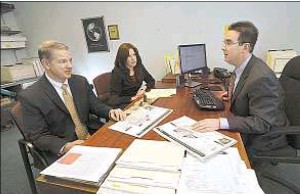New president wants to lure more employers to region.
“We now exist to generate original leads and by doing that, we will show the value of Penn’s Northeast.”
Ron Maloney President, Penn’s Northeast
The new head of Penn’s Northeast hopes to expand the mission of the economic development marketing group and focus on developing original leads for the organizations and communities it serves.

Penn’s Northeast President Ron Maloney, right, speaks with co-workers Bob Burke and Colleen Reardon in his office on Oak Street in Pittston.
Ron Maloney replaced retiring Penny Canella late last year. The 49-year-old Pittsburgh native with a varied career in economic development, often in the front lines helping lure employers, wants Penn’s Northeast to generate unique leads for companies looking to locate in the East Coast.
“Most of what Penn’s Northeast has been doing is reactive,” he said. “We now exist to generate original leads and by doing that, we will show the value of Penn’s Northeast.”
For the last few weeks, Mr. Maloney has been meeting people in the community and preparing the relaunch of the Penn’s Northeast website.
His appointment to the organization based in Pittston comes after a yearlong gut check by the Penn’s Northeast board and its economic development partners.
“This reflects what our partners want — unique leads,” said John Cognetti, chairman of the board.
Mr. Maloney came to the region from economic development posts in Pittsburgh and Florida.
A Pittsburgh native, one of his first jobs was one he created. He and his wife, Robin, founded and operated an employee relocation company. He took a job at the Pittsburgh Regional Alliance where he worked for 10 years, eight of those as a vice president of the 10-county regional group. Most recently, he worked a three-county organization in Mississippi, where he was part of a team that lured global tire giant Yokohama and a $300 million investment in a facility that could employee as manyas2,000.
Mr. Maloney faces challenges in his new postranging from an evolving mission and new technology to anxious and cash-strapped partners of governments and economic development groups.
Creation
Penn’s Northeast was formed as a cooperative of sorts funded by area economic development agencies as a regional marketer. Penn’s Northeast traces its roots back to PPL Corp., when the utility had an active role in economic development, seeing new businesses as a way to increase power demand.
PPL felt its patronage was not being used optimally as the economic development groups it supported competed, often vigorously, over the same leads. So it worked toward a regional approach.
Some counties that were part of the initial effort dropped out. Penn’s Northeast works with and for economic development groups and governments in Luzerne, Lackawanna, Monroe and Wayne counties, and Forest City and Berwick.
The recession made it more difficult for partners to support the group. They rebuffed attempts to increase their contributions, based on population. Mr. Maloney will continue efforts at getting money from private businesses, as well.
Mr. Maloney characterized some past concerted effort to land-specific industries as misplaced. Over the last few decades, for example, Northeast Pennsylvania made poorly timed bets. In 1999, it launched aneffort to market to high technology firms on the eve of the dotcom crash. After Sept. 11, 2001, and a subsequent blackout that shut down financial markets, economic development leaders sensed an opportunity to draw back office operations in an effort that became known as Wall Street West. In terms of new jobs or operations in the area, very little came of the effort. The 2007 financial crisis, stymied any momentum the Wall Street West movement had.
Different approach
Doubling down on a single sector is misguided, Mr. Maloney said, although he said he sees some promise in the current push to leverage the Commonwealth Medical College and private biomedical employers for a push for medical and science related businesses. Even in the case of the his hometown of Pittsburgh, where the pain of steel’s demise is more recent than NEPA’s loss of the coal industry, the tectonic shift in the economy forced progress.
“The case can be made that the fall of steel is one of the best things that could have happened to Pittsburgh,” he said, noting that it resulted in a blossoming of higher education, research and development and entrepreneurism that stabilized and diversified the economy.
James Cummings of Mericle Commercial Real Estate, was the first full-time executive director of Penn’s Northeast, and he’s seen the change in the site selection process. The Internet and abundance of information has leveled the process. Site selection professionals don’t need to got hrough local or even regional agencies.
While some participants questioned the value of Penn’s Northeast, Mr. Cummings can see it plainly, recognizing that companies prefer the regional, borderless approach. Mericle is a financial supporter of Penn’s Northeast. Contact the writer: dfalchek@timesshamrock.com





